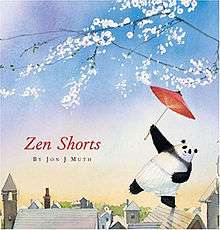Zen Shorts
Zen Shorts is a 2005 children's picture book by Jon J. Muth. The book was followed by Zen Ties in 2008.
 | |
| Author | Jon J. Muth |
|---|---|
| Country | United States |
| Language | English |
| Published | 2005 (Scholastic Press) |
| Pages | 40 |
| ISBN | 978-0-439-33911-7 |
| OCLC | 53084041 |
| [E] 22 | |
| LC Class | PZ7.M97274 Ze 2005 |
| Followed by | Zen Ties |
Plot
Three children, Karl, Michael and Addy, encounter a giant panda named Stillwater. The panda carries a red umbrella and speaks in a "slight panda accent". For the next three days, the three kids visit Stillwater. The panda rewards each with instructive anecdotes. To Michael he tells a story about good and bad boundaries, he tells Addy a story about the value of material goods, and Karl a story on how to hold frustration. Two of them are from Zen Buddhist literature and the other story is from Taoism. The stories illustrate the importance of meditation, and encourage readers to think about things that may be hard to imagine. They have strong themes about open-mindedness, compassion, and not getting too upset about things.
The name of the first story "Uncle Ry and the Moon" is a reference to the Zen hermit Ryokan Taigu.[1] In it, Uncle Ry lives in a lonely place, and finds a thief in his house. Taking pity on the poverty of the thief, Ry gives him his own robe, his only possession.
The next story is the Taoist story of "The Farmer's Luck", where what first appears to be bad luck turns out to be good luck, and vice versa.[2]
The final story "A Heavy Load" is a version of a Zen story of two monks who meet a woman unable to cross some water.[3] The older monk carries the woman across, but she fails to thank him. The young monk broods on the incident, but the older one says, "I set the woman down hours ago. Why are you still carrying her?"
Reception
Bruno Navasky, of The New York Times, reviewed the book saying, "Muth attributes the third to a Taoist tradition, but for me it calls to mind most vividly the popular picture book Fortunately, by Remy Charlip, with whom Muth has also worked. In any case, the cultural blurrings won't reduce the pleasure with which this book is received, and most children would surely vouchsafe Jon Muth the pleasure of a one-handed round of applause for his elegant tale."[4] A Kirkus Reviews review says, "The Buddha lurks in the details here: Every word and image comes to make as perfect a picture book as can be."[5] A Publishers Weekly review says, "Readers will fall easily into the rhythm of visits to Stillwater and his storytelling sessions, and many more will fall in love with the panda, whose shape and size offer the children many opportunities for cuddling."[1] A Scholastic Review says, "With graceful art and simple stories that are filled with love and enlightenment, the author and Stillwater the bear present three ancient Zen tales. Includes a factual note on Zen."
Zen Shorts spent 41 weeks on the New York Times bestseller list.[6]
Awards
References
- Zen Shorts (book review), Publishers Weekly, 2005-02-28, Vol. 252 Issue 9, p66-67.
- Charlie Ambler, Zen Story: Maybe, The Daily Zen, 2015-03-20
- Farmer Sean, Two Monks and a Woman, medium.com, 2018-07-01
- Children's Books, New York Times 2005-07-10
- Kirkus Reviews, 2005-02-01, Vol. 73 Issue 3, p179. (Book review)
- Jon J Muth, R. Michelson Galleries
- American Booksellers Association Archived 2009-06-21 at WebCite
- American Library Association